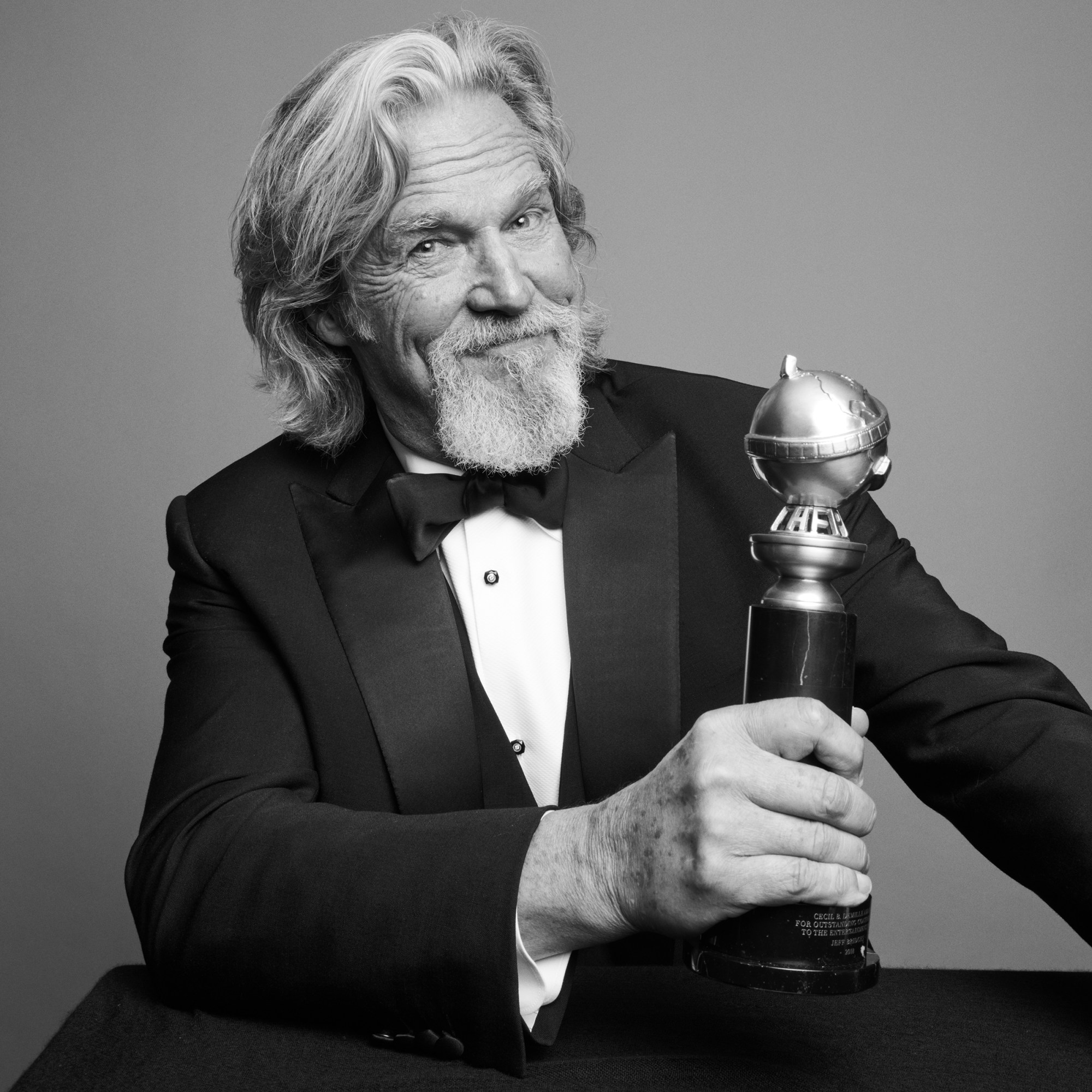
- Cecil B. DeMille
Ready for My deMille: Profiles in Excellence – Jeff Bridges, 2019
"Arial",sans-serif;color:#550016″> was presented to its namesake visionary director, the Hollywood Foreign Press Association has awarded its most prestigious prize 66 times. From Walt Disney to Bette Davis, Elizabeth Taylor to Steven Spielberg and 62 others, the deMille has gone to luminaries – actors, directors, producers – who have left an indelible mark on Hollywood. Sometimes mistaken with a career achievement award, per HFPA statute, the deMille is more precisely bestowed for “outstanding contributions to the world of entertainment”. In this series, HFPA cognoscente and former president Philip Berk profiles deMille laureates through the years.
John Wayne’s iconic, Oscar-winning character Rooster Cockburn in the Coen Brothers’ remake of True Grit and made it his own. It became one of the screen’s truly great performances. But it didn’t win him a single award, which he accepted with his usual grace and quiet modesty. That’s Jeff Bridges, never one to call attention to himself. And now, after 60 years in the business, he can truly boast a body of work the equal of any actor working today.
Crazy Heart – as Bad Blake, the down-on-his-luck, alcoholic country music singer – that finally earned him his long-overdue Golden Globe and Oscar for Best Performance by an Actor in a Leading Role. Jeff has been working since 1958 when as a kid he appeared occasionally on his father’ s TV show Sea Hunt. But it was his first starring role thirteen years later in The Last Picture Show that earned him an Oscar nomination as Best Supporting Actor and made him an overnight star.
Peter Bogdanovich’s classic that established him as Hollywood’s top juvenile, and suddenly he was much in demand. John Huston used him in Fat City, Robert Benton in Bad Company, Richard Sarafian in Lolly-Madonna XXX, and Lamont Johnson in The Last American Hero, all to strong positive reviews. However, it was his role in John Frankenheimer’s version of Eugene O’Neill’s The Iceman Cometh that proved he was not just a pretty face but could go toe to toe with his legendary costars Lee Marvin, Fredric March, and Robert Ryan.
Clint EastwoodMichael Cimino, but it was Cimino who later gave him a pivotal role in his much-maligned Heavens Gate. Before that he starred in Frank Perry’s Rancho Deluxe, Howard Zieff’s Hearts of the West, and Bob Rafelson’s Stay Hungry (which introduced a young bodybuilder by the name of Arnold Schwarzenegger) all critical successes. He also headlined LaMont Johnson’s Somebody Killed Her husband, William Richert’s Winter Kills, and Ivan Passer’s superb Cutter’s Way.
Jessica Lange’s leading man in his blockbuster remake of King Kong. Disney used him in TRON, an audacious SciFi exercise, and then he made a trio of critically acclaimed films, Robert Mulligan’s Kiss Me Goodbye, Taylor Hackford’s Against All Odds, and John Carpenter’s Starman, the latter earning him his first Golden Globe nomination as Best Actor and his third Oscar nomination.
Glenn Close in Jagged Edge, Rosanna Arquette in Hal Ashby’s 8 Million Ways to Die, Jane Fonda in Sidney Lumet’s The Morning After, and Kim Basinger in Nadine, all sadly run of the mill thrillers. But then he got back on track when Francis Ford Coppola gave him the role of the maverick car designer Preston Tucker in Tucker: The Man and His Dream. Unfortunately, the film failed to connect with audiences and remains today as his most underappreciated movie, even though it earned Martin Landau a Golden Globe as Best Supporting Actor.
Beau and Michelle Pfeiffer in Steve Kloves’ The Fabulous Baker Boys, which once again, despite glowing reviews and numerous nominations was only able to salvage one award, a Golden Globe as Best Actress for Pfeiffer. With so many great performances behind him, Jeff’s acclaim was long overdue, and it was The Fisher King, for which he was again nominated for a Golden Globe as Best Actor, that turned the tide for him. He was now the choice of the world’s best directors among them, Peter Weir, Walter Hill, and Ridley Scott. Barbra Streisand used him in The Mirror Has Two Faces, and then despite having playing villains and heroes opposite many of the screen’s most beautiful actresses, he chose to play the Dude in the Coen Brothers’ cult comedy The Big Lebowski, a slacker role that endeared him to millions of stoners and film lovers the world over and which eventually became his most famous role.
The Contender, for which he earned yet another Golden Globe nomination as Best Actor, and Gary Ross’s Seabiscuit, which ended up being his most nominated film ever.
Crazy Heart. That performance finally earned him his Oscar and Golden Globe as Best Actor, an accolade that recognized 30 years of superb work, something the Coen Brothers acknowledged when they chose him to play Rooster Cockburn in their remake of True Grit, arguably his greatest performance. Since then he’s been working steadily, invariably underutilized, except in David MacKenzie’s Hell or High Water for which he again received Golden Globe and Oscar nominations as Best Supporting Actor.
Fearless, and Blown Away (in which he co-starred with his late father, Lloyd Bridges).

